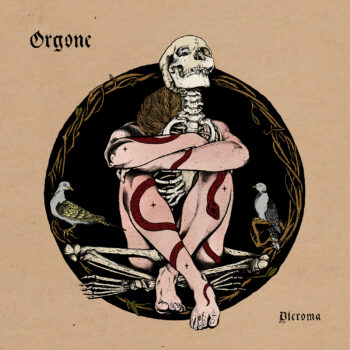Pleroma is a kaleidoscope of colors and emotions, composed like an odyssey. It showers listeners with haunting arpeggios, winding riffs, and chamber instruments, adorned with a crown of myriad vocal styles both harsh and soothing, male and female – a far-reaching and royally ambitious sum and completion of its divine components. For an act that saturates its assault with all the decadence and bombast of a metal opera, Orgone is deeply entrenched in subtlety and restraint. Songwriting takes front and center, and nary a moment is wasted. It’s an exclamatory manifesto and toppling breeze of complete freedom and organicity – truly a religious pilgrimage of music shouted and whispered alike.
The act’s eighteen-year existence has been distinctly underground, its entire discography released independently and physical copies provided in limited runs. Adding to its obscure nature, it’s difficult to determine what style Pittsburgh’s Orgone professes exactly. Beginning as a technical deathgrind outfit with 2006’s debut EP Accumulator and 2007’s The Goliath, before drifting into more progressive death Opeth territory with the inclusion of acoustic and chamber instruments in 2014’s The Joyless Parson,1 Pleroma is even more elusive. With its sound recalling the hallmarks of post-metal, hardcore, technical death metal, jazz, and avant-garde, influences like Precambrian-era The Ocean, Diskord, Amia Venera Landscape, and Unexpect emerge – with the organic fluidity of Sleepytime Gorilla Museum and Language-era The Contortionist. In spite of all comparisons, Orgone exists in a league all its own.
What stands out particularly about Orgone is the act’s patience and restraint. While often an album momentum killer, Pleroma’s multiple instrumentals add uniquely graceful movements. The builds of the orchestral “Silentium” to post-metal “Approaching Babel” to the first metal attack of “Valley of the Locust” shows an impressive sense of crescendo and dynamics, likewise appealed in four-track run from the jazzy French lounge and female spoken word of “Hymne à la Beauté,” the ambient pulsing “Flâneurs,” the playful yet mournful elegy of “Lily by Lily,” and the more classical and cinematic “Ubiquitous Divinity.” While influences are scattered and seem contrived on paper, the songwriting and transitions are so fucking smooth, you would miss that they are separate tracks. Introductions of the metal attack are tantalizing in “Approaching Babel,” “Ubiquitous Divinity,” and “Mourning Dove,” hinting at the assault to come in successive tracks. Each track maintains its own identity in its respective genre pickings, but always in reference to the good of the whole – Pleroma truly. And all this is just the instrumentals.
Like the instrumentals, the metal tracks also exist on a slow and steady crescendo, not unlike the steady build of a master storyteller, as each successive track grows in intensity and fury. Letting multi-instrumentalist and Orgone mastermind Stephen Jarrett carry Pleroma’s movements through a brain-frying guitar and bass technicality that borders between intensely calculated and maddeningly unhinged, emphasized by his frantic hardcore barks, while percussionist Justin Wharton, in particular, shines in the ebb-and-flow dynamic of “Valley of the Locust,” both members highlighting passages of haunting strings and stirring vocals and blasting punishment through groovy complex riffs and dragged-out melodies that morph seamlessly between lush harmony and brutal dissonance. Eighteen-minute behemoth “Trawling the Depths” focuses on labyrinthine composition with herculean might, the heights of blastbeats and soaring riffs contrasting with passages of chamber acoustics and dark atmospherics, patiently guided across a scorched landscape. “Schemes of Fulfillment” offers the truest metal track here as well as album climax, as vocals are spit with a sudden ferocity that recalls Sleepytime Gorilla Museum’s “Helpless Corpse Enactment” alongside the heaviest riffs of the album. Finally, closing track “Pleroma” serves as the falling action – clean singing, meandering guitar, and scattered bass noodles giving a survey of the abstract destruction alongside brass explosions.
Pleroma is challenging, over an hour of content that requires multiple listens to unearth all its secrets. After a decade of silence, Orgone returns with a mighty hammer that is in equal parts evocative, progressive, diverse, and cohesive. Seamless transitions between the chamber elements and the more punishing passages with a unique melodic template that defies easy categorization all collide in a thoughtful and maddening, blindingly maximalist and bitingly minimalist interchangeably. Its more airy riffs can feel suffocating compared to a potential death metal crunch they could offer, but Orgone’s more exploratory post-metal edge makes Pleroma distinctly transcendent. “Pleroma” refers to the sum of divinity in the biblical New Testament, and Orgone’s Pleroma is divinely good.
Rating: 4.5/5.0
DR: 6 | Format Reviewed: 320 kb/s mp3
Label: Self-Released
Websites: facebook.com/orgone | orgoneus.bandcamp.com
Releases Worldwide: June 24th, 2024
The post Orgone – Pleroma Review appeared first on Angry Metal Guy.


